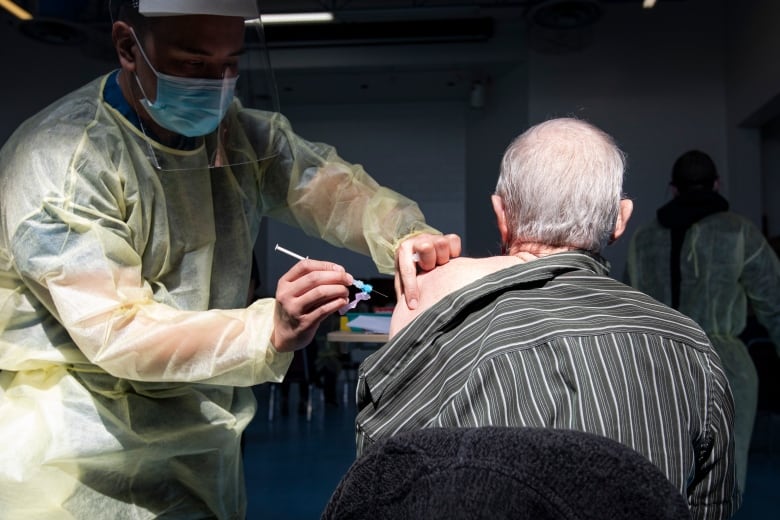Do you need a spring COVID-19 vaccine? Research backs extra round for high-risk groups
New guidelines suggest certain high-risk groups could benefit from having another dose of a COVID-19 vaccine this spring — and more frequent shots in general — while the broader population could be entering once-a-year territory, much like an annual flu shot.
Medical experts told CBC News that falling behind on the latest shots can come with health risks, particularly for individuals who are older or immunocompromised.
“Even when the risk of infection starts to increase, the vaccines still do a really good job at decreasing risk of severe disease,” said McMaster University researcher and immunologist Matthew Miller.
Who needs another COVID shot?
Back in January, Canada’s national vaccine advisory body set the stage for another round of spring vaccinations. In a statement, the National Advisory Committee on Immunization (NACI) stated that starting in spring 2024, individuals at an increased risk of severe COVID may get an extra dose of the latest XBB.1.5-based vaccines, which better protect against circulating virus variants.

That means:
- Adults aged 65 and up.
- Adult residents of long-term care homes and other congregate living settings for seniors.
- Anyone six months of age or older who is moderately to severely immunocompromised.
The various spring recommendations don’t focus on pregnancy, despite research showing clear links between a COVID infection while pregnant, and increased health risks. However, federal guidance does note that getting vaccinated during pregnancy can protect against serious outcomes.
“Vaccinated people can also pass antibodies to their baby through the placenta and through breastmilk,” that guidance states.
What do the provinces now recommend?
Multiple provinces have started rolling out their own regional guidance based on those early recommendations — with a focus on allowing similar high-risk groups to get another round of vaccinations.
B.C. is set to announce guidance on spring COVID vaccines in early April, officials told CBC News, and those recommendations are expected to align with NACI’s guidance.
In Manitoba, high-risk individuals are already eligible for another dose, provided it’s been at least three months since their latest COVID vaccine.
Meanwhile Ontario’s latest guidance, released on March 21, stresses that high-risk individuals may get an extra dose during a vaccine campaign set to run between April and June. Eligibility will involve waiting six months after someone’s last dose or COVID infection.
Having a spring dose “is particularly important for individuals at increased risk of severe illness from COVID-19 who did not receive a dose during the Fall 2023 program,” the guidance notes.
And in Nova Scotia, the spring campaign will run from March 25 to May 31, also allowing high-risk individuals to get another dose.
Specific eligibility criteria vary slightly from province-to-province, so Canadians should check with their primary care provider, pharmacist or local public health team for exact guidelines in each area.
It’s been four years since COVID-19 was declared a pandemic, and new research suggests your age may determine how often you should get a booster shot.
Why do the guidelines focus so much on age?
The rationale behind the latest spring guidelines, Miller said, is that someone’s age remains one of the greatest risk factors associated with severe COVID outcomes, including hospitalization, intensive care admission and death.
“So that risk starts to shoot up at about 50, but really takes off in individuals over the age of 75,” he noted.
Canadian data suggests the overwhelming majority of COVID deaths have been among older adults, with nearly 60 per cent of deaths among those aged 80 or older, and roughly 20 per cent among those aged 70 to 79.
People with compromised immune systems or serious medical conditions are also more vulnerable, Miller added.

Will people always need regular COVID shots?
While the general population may not require shots as frequently as higher-risk groups, Miller said it’s unlikely there will be recommendations any time soon to have a COVID shot less than once a year, given ongoing uncertainty about COVID’s trajectory.
“Going forward, I suspect for pragmatic reasons, [COVID vaccinations] will dovetail with seasonal flu vaccine campaigns, just because it makes the implementation much more straightforward,” Miller said.
“And although we haven’t seen really strong seasonal trends with SARS-CoV-2 now, I suspect we’ll get to a place where it’s more seasonal than it has been.”
In the meantime, the guidance around COVID shots remains simple at its core: Whenever you’re eligible to get another dose — whether that’s once or twice a year — you might as well do it.
What does research say?
One analysis, published in early March in the medical journal Lancet Infectious Diseases, studied more than 27,000 U.S. patients who tested positive for SARS-CoV-2, the virus behind COVID, between September and December 2023.
The team found individuals who had an updated vaccine reduced their risk of severe illness by close to a third — and the difference was more noticeable in older and immunocompromised individuals.
Another American research team from Stanford University recently shared the results from a modelling simulation looking at the ideal frequency for COVID vaccines.
The study in Nature Communications suggests that for individuals aged 75 and up, having an annual COVID shot could reduce severe infections from an estimated 1,400 cases per 100,000 people to around 1,200 cases — while bumping to twice a year could cut those cases even further, down to 1,000.
For younger, healthier populations, however, the benefit of regular shots against severe illness was more modest.
The outcome wasn’t a surprise to Stanford researcher Dr. Nathan Lo, an infectious diseases specialist, since old age has consistently been a risk factor for severe COVID.
“It’s almost the same pattern that’s been present the entire pandemic,” he said. “And I think that’s quite striking.”
More frequent vaccination won’t prevent all serious infections, he added, or perhaps even a majority of those infections, which highlights the need for ongoing mitigation efforts.
View original article here Source










